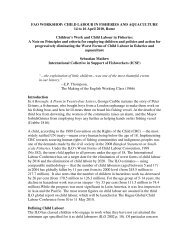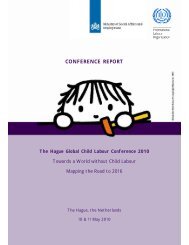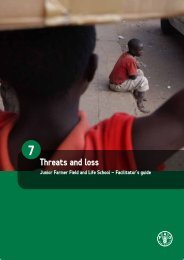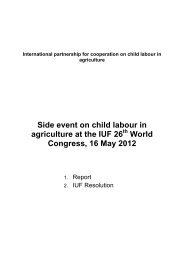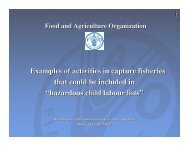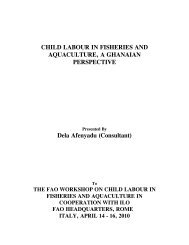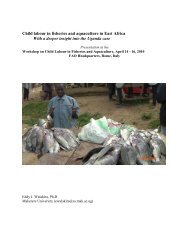Mainstreaming responses to the girl child in agriculture - Food ...
Mainstreaming responses to the girl child in agriculture - Food ...
Mainstreaming responses to the girl child in agriculture - Food ...
You also want an ePaper? Increase the reach of your titles
YUMPU automatically turns print PDFs into web optimized ePapers that Google loves.
or religious) (UCW, 2008). The school calendar may be <strong>in</strong>compatible with agricultural<br />
work schedul<strong>in</strong>g for boys and <strong>girl</strong>s. If <strong>child</strong>ren are attempt<strong>in</strong>g <strong>to</strong> comb<strong>in</strong>e school<br />
attendance with excessively long and heavy agricultural work, and for <strong>girl</strong>s domestic<br />
responsibilities (<strong>in</strong>clud<strong>in</strong>g cook<strong>in</strong>g, wash<strong>in</strong>g, fetch<strong>in</strong>g firewood and water, and<br />
<strong>child</strong>care), <strong>the</strong>ir school<strong>in</strong>g will be <strong>in</strong>terfered with, or <strong>the</strong>y leave school prematurely.<br />
Educat<strong>in</strong>g <strong>girl</strong>s has enormous repercussions for future prosperity of families and<br />
societies. Empirical evidence from a range of countries has shown that educat<strong>in</strong>g <strong>girl</strong>s is<br />
one of <strong>the</strong> most effective ways of fight<strong>in</strong>g poverty 9 . However, globally 55% of <strong>the</strong><br />
<strong>child</strong>ren currently denied an education are <strong>girl</strong>s (ILO, 2006b). Parents may <strong>in</strong>vest more<br />
<strong>in</strong> <strong>the</strong>ir sons’ education than <strong>the</strong>ir daughters’. In many cultures, boys are valued more<br />
than <strong>girl</strong>s, and <strong>girl</strong>s are socialized <strong>to</strong> accept a lower status. A lower social status can lead<br />
<strong>girl</strong>s <strong>to</strong> have lower self-esteem and fewer opportunities. Leav<strong>in</strong>g school prematurely<br />
impairs <strong>girl</strong>s’ future job opportunities and long-term livelihood prospects. This <strong>in</strong> turn<br />
perpetuates <strong>the</strong> cycle of poverty and exploitation from one generation of women <strong>to</strong> <strong>the</strong><br />
next. One of <strong>the</strong> objectives of <strong>the</strong> International Partnership for Cooperation on Child<br />
Labour <strong>in</strong> Agriculture is <strong>to</strong> overcome <strong>the</strong> gender gap <strong>in</strong> rural education.<br />
Econometric studies on <strong>child</strong> labour datasets <strong>in</strong>creas<strong>in</strong>gly also fac<strong>to</strong>r <strong>in</strong> gender as<br />
a variable, which facilitates an analysis of <strong>the</strong> effects of <strong>the</strong> sexual division of labour <strong>in</strong><br />
society and <strong>the</strong> different roles assigned <strong>to</strong> women and men. For example, while a sexdisaggregated<br />
study <strong>in</strong> Bosnia and Herzegov<strong>in</strong>a confirmed that education is crucial for<br />
<strong>the</strong> transition from unemployment <strong>to</strong> employment for both young women and men<br />
(Gurbuzer & Koseleci 2008), <strong>the</strong> results also <strong>in</strong>dicate that education is more critical for<br />
young women than for young men. Society’s ability <strong>to</strong> accept new economic roles for<br />
older <strong>girl</strong>s, and <strong>the</strong> economy’s ability <strong>to</strong> create <strong>the</strong> jobs <strong>to</strong> accommodate older <strong>girl</strong>s are<br />
key however. A study <strong>in</strong> Pakistan found that education promotes entry <strong>in</strong><strong>to</strong> <strong>the</strong> more<br />
highly remunerated occupations for men. For women, however, it did so only beyond<br />
10 years education. Indeed, <strong>the</strong> earn<strong>in</strong>gs <strong>in</strong>crements from an extra year of education are<br />
substantially greater for women than men <strong>in</strong> all occupations except <strong>agriculture</strong> (World<br />
Bank, 2008). This may <strong>in</strong>dicate that <strong>the</strong> employment prospects of women are more<br />
sensitive <strong>to</strong> education, but wages <strong>in</strong> <strong>agriculture</strong> do not <strong>in</strong>crease substantially.<br />
A range of country specific studies have shed light on how gender related fac<strong>to</strong>rs<br />
affect educational atta<strong>in</strong>ment levels 10 . In Turkey, <strong>the</strong> fac<strong>to</strong>rs that affect <strong>the</strong> demand for<br />
education from both boys and <strong>girl</strong>s were studied (Goksel, 2008). Household <strong>in</strong>come<br />
growth, improvement <strong>in</strong> parents’ education and fertility control contributed positively <strong>to</strong><br />
school atta<strong>in</strong>ment for all <strong>child</strong>ren, and <strong>the</strong> positive effect was higher for <strong>girl</strong>s than it was<br />
for boys. A change <strong>in</strong> legislation which raised <strong>the</strong> m<strong>in</strong>imum years of compulsory<br />
education for all <strong>child</strong>ren from a 5 <strong>to</strong> 8 year duration also acted as a catalyst for improved<br />
education for both boys and <strong>girl</strong>s.<br />
In summary, studies are also underway <strong>to</strong> shed light on <strong>the</strong> household decision<br />
mak<strong>in</strong>g processes regard<strong>in</strong>g send<strong>in</strong>g <strong>child</strong>ren <strong>to</strong> work or school. Such studies are<br />
provid<strong>in</strong>g <strong>in</strong>dications that birth order and sex can be critical fac<strong>to</strong>rs regard<strong>in</strong>g <strong>the</strong><br />
likelihood that a <strong>child</strong> receives access <strong>to</strong> education (Hirata 2008).<br />
U. Murray, P. Hurst - Draft for discussion - 6






